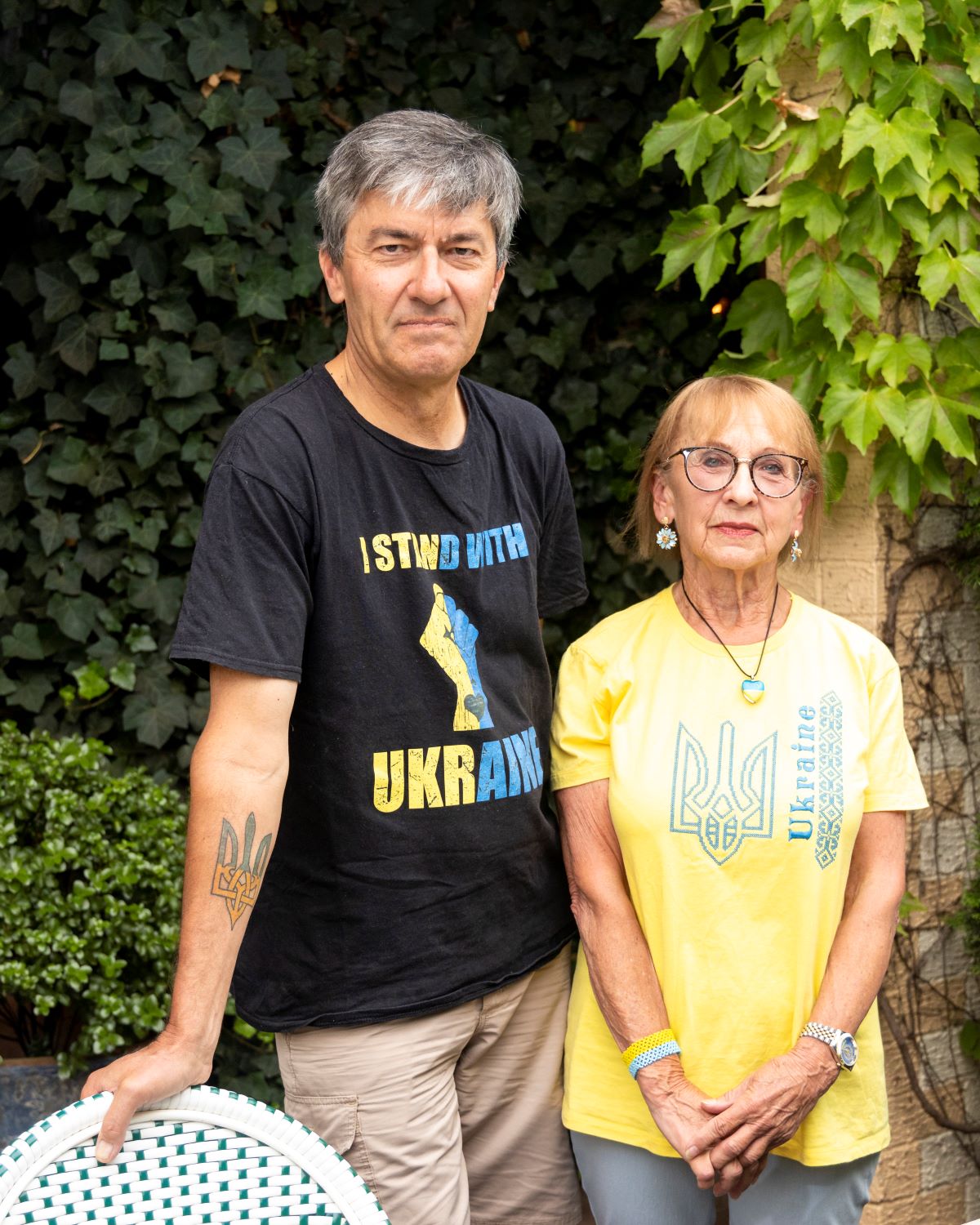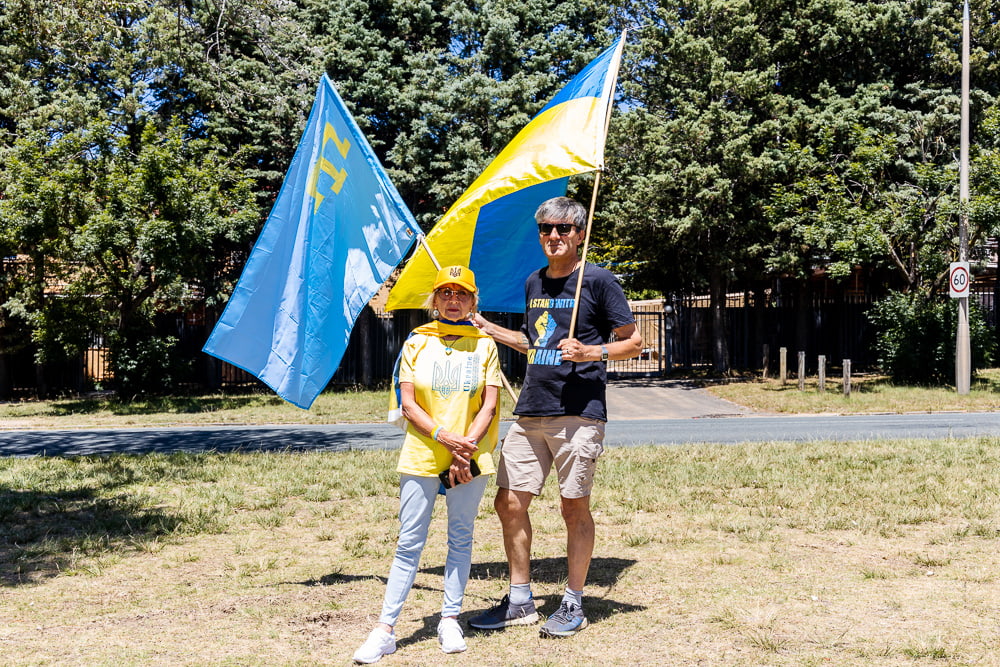Friday 24 February 2023 will mark 365 days since Russian troops crossed the border into Ukraine. It will also mark 365 days since Ukrainians around the world began a crusade to bring freedom to their homeland.
In Canberra, members of the Ukrainian community stand outside the Russian embassy six days a week to fly their flag in the face of Russian diplomats.
Ukrainian-Canberrans say they face propaganda-fuelled vitriol from diplomats at the Russian embassy, and middle fingers from passersby, but feel empowered by the support shown by the vast majority of ACT residents.
To keep the invasion at the forefront of Canberrans’ minds, the Ukrainian community are hosting a vigil outside the Russian embassy on the one-year anniversary, 24 February, from 10am to 5pm.
Ukrainian immigrants, Marusya Jacyshyn and Andrew Liszczynsky, have stood at the frontline of local protests since day one.
There’s strength in being proud of your heritage, said Mr Liszczynsky, as he held back tears while explaining the heartfelt meaning of his latest tattoo.
Stamped on his right arm is the Ukrainian word for ‘freedom’ filled with bright yellow and blue ink.
“It’s the Ukrainian national crest. It’s called a tryzub,” he said.
“The reason I got it was because of the invasion on Ukraine. I wanted to identify and acknowledge my heritage.”
Ms Jacyshyn wears a blue and yellow watch emblazoned with the tryzub to every rally, every protest.
On the back, she has engraved 24/02/2022, with “room left for day of victory”.
Ms Jacyshyn and Mr Liszczynsky listed over a dozen nationalities of protestors who stand and rally with them, which they said proves humanity is stronger than war.
The continued presence of Russian diplomats in Australia has made Ms Jacyshyn “terribly disappointed with the Labor Government”.
But, what about solidarity from the Australian community?
“We’ve had outstanding support from Australians,” she said.
Mr Liszczynsky and Ms Jacyshyn said it’s heartening to have a “passionate minority” of Russian Canberrans who stand with them.
The intention behind the upcoming vigil is to send a clear and direct message to Russian diplomats in Canberra: “Get out of Ukraine, and get out of Australia for that matter,” she said.
“Please come and support us. Be there,” he said.
“If you’re from a community group, bring your flag because if we can have as many flags as possible, it’s symbolic.
“Sometimes when you see one person with a Ukrainian flag, that can be just as inspirational as hundreds.”
“Unite with Ukraine. Come and support,” Ms Jacyshyn said. “Even if you can only come for 10 minutes or half an hour or whatever you can.”
The Ukrainian Vigil to mark one year since the Russian invasion of Ukraine will be held on Friday 24 February 10am-5pm outside the Russian embassy on Canberra Avenue, Griffith ACT.
Ukrainian displacement and Australian immigration

Mr Liszczynsky and Ms Jacyshyn share a similar and continuing story.
During World War II, both their parents met in displacement camps before eventually migrating to Australia.
Ms Jacyshyn’s mother was from a Western Ukrainian village before she was forcibly removed from the country and taken to Germany, where she was subjected to forced labour for seven years.
Her father was raised in the Carpathian Mountains area of Western Ukraine and fought in the Ukrainian army before meeting Ms Jacyshyn’s mother in a German displacement camp.
She and her older sister were both born in the camp before the family arrived in Canberra in July 1949, where her younger sister was born.
“My father died when he was 56. I think it was all to do with the war and he was sick and he died, but our mother lived to be 92,” Ms Jacyshyn said.
“So, she lived to see the reconnection of both families,” she smiled. “After 60 years we found our family in Ukraine and truly when we arrived it was like we’d never been apart.”
Throughout the invasion, Ms Jacyshyn has kept in contact with her Ukrainian family, offering any support she can provide. They’ve staunchly resisted her assistance, displaying the strength and determination of Ukrainians, but have reluctantly accepted some financial support, she said.
Mr Liszczynsky’s father was a prisoner of war in World War II after he volunteered for the German army.
“The German army at that time as they were coming across said, ‘fight for us and we’ll free your homeland from Russia’,” he said.
“So, he was part of the German army, but then they ended up being prisoners of war.”
Released in England into a displacement camp, his father met his mother who had escaped Ukraine.
The family moved to Melbourne in 1957, and Mr Liszczynsky was born two years after their arrival.
Although Ms Jacyshyn and Mr Liszczynsky were raised in Australia, their connection to Ukraine runs deep, and they grieve for the destruction of their ancestral home.
“The amount of culture and history that’s been destroyed for one person’s ego,” Mr Liszczynsky said.
Get all the latest Canberra news, sport, entertainment, lifestyle, competitions and more delivered straight to your inbox with the Canberra Daily Daily Newsletter. Sign up here.



